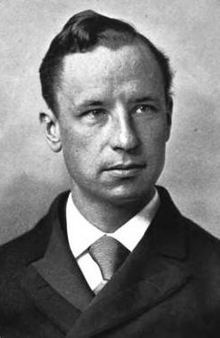William Eustis Russell | |
|---|---|
 Photo published in the 1890s | |
| 37th Governor of Massachusetts | |
| In office January 8, 1891 – January 4, 1894 | |
| Lieutenant | William H. Haile Roger Wolcott |
| Preceded by | John Q. A. Brackett |
| Succeeded by | Frederic T. Greenhalge |
| Mayor of Cambridge, Massachusetts | |
| In office 1884–1887 | |
| Preceded by | James Augustus Fox |
| Succeeded by | Henry Gilmore |
| Member of the Board of Aldermen of Cambridge, Massachusetts | |
| In office 1883–1884 | |
| Member of the Common Council of Cambridge, Massachusetts | |
| In office 1882–1882 | |
| Personal details | |
| Born | January 6, 1857 Cambridge, Massachusetts, US |
| Died | July 16, 1896 (aged 39) Sainte-Adelaide-de-Pabos, Quebec, Canada |
| Political party | Democratic |
| Spouse | Margaret Manning Swan |
| Signature | |
William Eustis Russell (January 6, 1857 – July 16, 1896) was a lawyer and Democratic Party politician from Massachusetts. He served four terms as mayor of Cambridge, and was the 37th governor of Massachusetts, serving from 1891 to 1894. He was the state's second youngest-ever chief executive, and was the first Democrat since the American Civil War to serve more than one term in that office.
Educated at Harvard and Boston University Law School, Russell practiced law in the family firm. He was politically a conservative Democrat, supporting the presidential campaigns of Grover Cleveland and the gold standard for the national currency. He gave a speech in favor of the latter at the 1896 Democratic National Convention immediately prior to William Jennings Bryan's Cross of Gold speech, and refused efforts to draft him as an opponent to Bryan for the presidential nomination. About a week later, he died quite suddenly at a fishing camp in Quebec; he was 39. He was viewed by eastern Democrats as a future party leader and presidential contender.[1]
- ^ Haynes, p. 227.